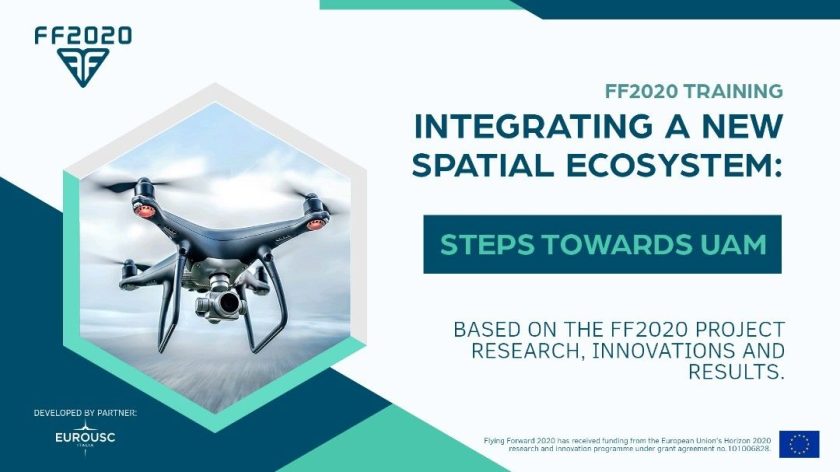Flying Forward 2020 (FF2020) has launched the first module of the online training programme ‘Integrating a New Spatial Ecosystem: Steps Towards Urban Air Mobility’. Their consortium partner EuroUSC Italia developed the training with the aim of contributing to the scalability of Urban Air Mobility (UAM) in a European setting, considering the objectives and key results of the FF2020 project. ‘Module 1: UAM and FF2020 Introduction’ is the first of seven independent units from the course to be published this year. The training can be accessed via the EuroUSC learning platform and taken in an asynchronous environment.
The learning modules were created for members from academia, UAM use case developers, sales and procurement specialists, policy-makers and other professionals interested in Urban Air Mobility compliancy. The course offers learners the flexibility of self-paced study and a self-assessment test at the end of each unit.
The training was developed based on interviews with potential end-users of UAM, with each module training on specific knowledge or technology from project partners, taking into account the needs of the users. FF2020 believes this training programme is the foundation for integrating Urban Air Mobility in Europe, grounded in the FF2020 concept, methodology and results achieved so far.
Flying Forward 2020 is scheduled to conclude in November 2023, and the training is one of its first key results this year. With these results, the project is committed to continuing to successfully impart its knowledge and state-of-the-art UAM approach to stakeholders, decision-makers and potential end-users.
The first module is out now; subsequent modules are expected to roll out through 2023.
Flying Forward 2020 is a collaborative three-year research and innovation project funded by the European Union under the Horizon 2020 programme. The project is developing an entire state-of-the-art Urban Air Mobility (UAM) infrastructure by incorporating this new form of mobility within the geospatial digital infrastructure of cities. It includes a governance model and framework, a regulatory framework, a geospatial digital infrastructure, a Digital Toolbox, an Identity of Things (IDoT) scheme, and interoperability frameworks. The solutions developed during the project will be tested in five living labs across Europe: Eindhoven, Milan, Zaragoza, Tartu and Oulu – enabling an open dialogue with stakeholders, end-users and citizens to improve processes and results. Ultimately, their goal is to have a positive and lasting impact on the quality of life of European citizens and to create sustainable partnerships and cities.
For more information:
www.ff2020.eu




